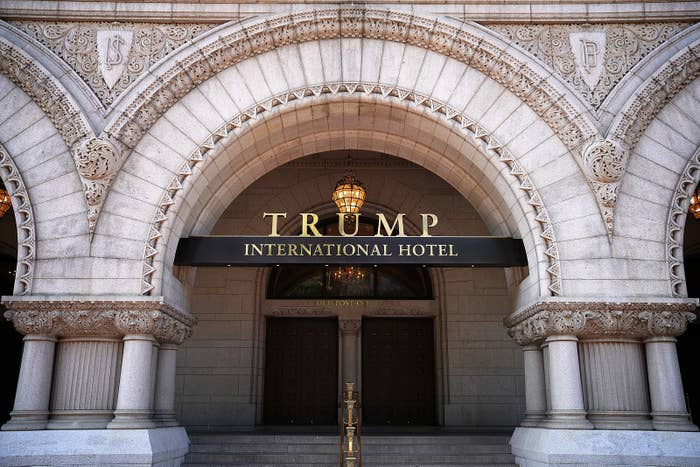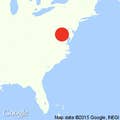
RICHMOND, Virginia — President Donald Trump's personal lawyers and attorneys from the Justice Department argued Tuesday that no one should be able to sue Trump for profiting from his businesses while he's in office — and for the first time in more than a year, things went well for the president in the case.
The US Court of Appeals for the 4th Circuit heard arguments in a lawsuit brought by Maryland and the District of Columbia accusing Trump of violating the foreign and domestic emoluments clauses of the US Constitution by refusing to give up his interest in the Trump International Hotel in Washington. To date, a federal judge in Maryland has repeatedly ruled against Trump.
But the three-judge 4th Circuit panel expressed deep skepticism Tuesday about DC's and Maryland's positions on a host of issues, including what exactly they wanted a judge to order Trump to do, whether claims that Trump's hotel had an unfair competitive advantage were too speculative, and whether DC and Maryland — or anyone, for that matter — could bring a lawsuit against a president under the emoluments clauses.
The attorney general offices in DC and Maryland sued Trump in June 2017, arguing that when foreign, state, or local officials patronize Trump’s businesses, the president profits and receives a prohibited “emolument.” The word “emolument” is generally defined as a financial benefit, but the definition is one of the major issues in dispute. The judge in Maryland, US District Judge Peter Messitte, agreed with DC and Maryland’s broad interpretation, and rejected the Justice Department’s position that it should only cover money that a public official received in exchange for official acts or an employer/employee arrangement.
The 4th Circuit — which is based in Richmond, Virginia, but covers federal courts in Maryland, Virginia, the Carolinas, and West — could order the case dismissed entirely, but there are other possible outcomes that would still represent a win for Trump. At a minimum, the Justice Department is arguing the 4th Circuit should allow an appeal to go forward on earlier rulings from Messitte, which would delay DC's and Maryland's efforts to pursue dozens of subpoenas they've issued against Trump's businesses. Messitte declined to give approval for an appeal at this stage, and allowed the subpoenas to go out.
Justice Department attorney Hashim Mooppan focused his arguments Tuesday on urging the court to toss the case outright, arguing there was no legal authority for anyone to sue the president under the emoluments clauses.
If no one could sue the president for accepting prohibited emoluments, Judge Dennis Shedd asked: "Where's the check on the president?" Mooppan replied that any sort of action against the president at least had to be authorized by Congress, and that had not happened. Mooppan also argued that the president presented a special situation, and left open the question of whether someone could file this type of lawsuit against a lower-ranking public official.
Loren AliKhan, DC's solicitor general, argued first for DC and Maryland. Judge Paul Niemeyer pressed AliKhan to explain what official action by Trump was at issue. He said Trump had scaled back his involvement in his business empire and turned over management to his sons and asked if that meant Trump was only passively holding the financial interests at issue. AliKhan replied that Trump made a decision to keep his business holdings, which offered a way for foreign governments to offer emoluments and for the president to accept them.
Shedd and Niemeyer grew frustrated that AliKhan would not provide a definite answer on what type of injunction they wanted a judge to impose on Trump — AliKhan said that an order requiring him to divest in the hotel would be one possible outcome, but it was too early to say what would be appropriate, and they wanted to leave it up to the lower court judge.
Shedd and Niemeyer asked if having Trump put his assets in a blind trust would be appropriate, and when AliKhan replied that it could be, the two judges pushed back, questioning how it could satisfy DC and Maryland if Trump were still getting any profit from his businesses.
"You seem to be ducking the question," Niemeyer said.
AliKhan said DC and Maryland would also be satisfied with a declaration from a judge saying that the president was in violation of the clauses, leaving it open how exactly he could come into compliance. Shedd mused whether such a declaration would be grounds for impeachment.
The judges questioned the broad interpretation of "emolument" adopted by DC and Maryland. Judge A. Marvin Quattlebaum Jr. asked if a public official who had a bank account insured by the US government would violate the emoluments clauses, since they were receiving a benefit in the form of protected assets. Shedd posed the same question about an official who held US Treasury bills. AliKhan said the emoluments clauses covered profits and advantages, not financial instruments where an official didn't exercise discretion over the benefits they received.
AliKhan said it crossed the line when the president received profits and actively solicited business from foreign governments. Shedd asked if DC and Maryland's interpretation would only protect career politicians. AliKhan replied that public officials who come in with certain types of assets were generally instructed to place them into a blind trust, which prompted a whole new round of questions from the judges about how a blind trust would satisfy DC and Maryland.
Shedd asked if a court could order that no person associated with a foreign government could stay at a Trump property. AliKhan said it would depend on the wording. Shedd then wondered if that scenario was similar to Trump's executive actions banning people from certain countries — predominantly majority-Muslim nations — from coming to the United States. Shedd asked: If Trump said no foreigners could stay at his hotel, how quickly would Maryland sue for discrimination? AliKhan replied that the case wasn't about foreigners but about foreign governments.
The court heard arguments first on DC's and Maryland's claims against Trump in his official capacity as president. The lawsuit was later updated to add a claim against Trump in his individual capacity, but DC and Maryland decided not to press it. However, Trump's personal lawyers were in court Tuesday to argue that the 4th Circuit should issue an order barring DC and Maryland from trying to sue Trump individually in the future. William Consovoy, Trump's personal attorney, argued that the president on an individual basis should be completely immune from this sort of lawsuit.
Niemeyer questioned whether the court should get into the substance of Consovoy's arguments at all if DC and Maryland were dropping the claim. However, the judges got into a tense back-and-forth with Maryland Assistant Attorney General Leah Tulin about whether there was a chance DC and Maryland might try to sue Trump individually in the future. Tulin said they did not plan on it, but she argued they weren't required to commit to never bringing it again.
Shedd said Trump probably felt there was a risk that he would be sued personally in the future, which Shedd said he understood and asked Tulin why DC and Maryland wouldn't take it off the table. Tulin repeated that there was no requirement under the rules, and that the judge was asking her to answer a question about internal litigation strategy.
Tulin said that if DC and Maryland tried to bring individual claims against Trump in the future, Trump could raise various challenges that a judge would have to address first. Shedd, who throughout the hearing questioned how Messitte had handled the case and whether he'd tried to dictate how DC and Maryland pursued it, said to Consovoy, "You don't think you would win." Consovoy replied that he was an optimist.
Consovoy argued that DC and Maryland's claims — that Trump's hotel had an unfair advantage and hurt other local hotels and venues — were too speculative. In response, Shedd wondered whether the fact that Trump inspired so many protests against him in DC had, in fact, helped other hotels in the region. It wasn't speculation to say that people coming to protest Trump weren't booking rooms at Trump's hotel, the judge quipped.
At the end of arguments, as is tradition in the 4th Circuit, the judges came down from the bench to shake hands with the lawyers. As Shedd shook Tulin's hand, he asked, "Was it fun?" He then laughed and answered his own question for her: "Not so much!"

